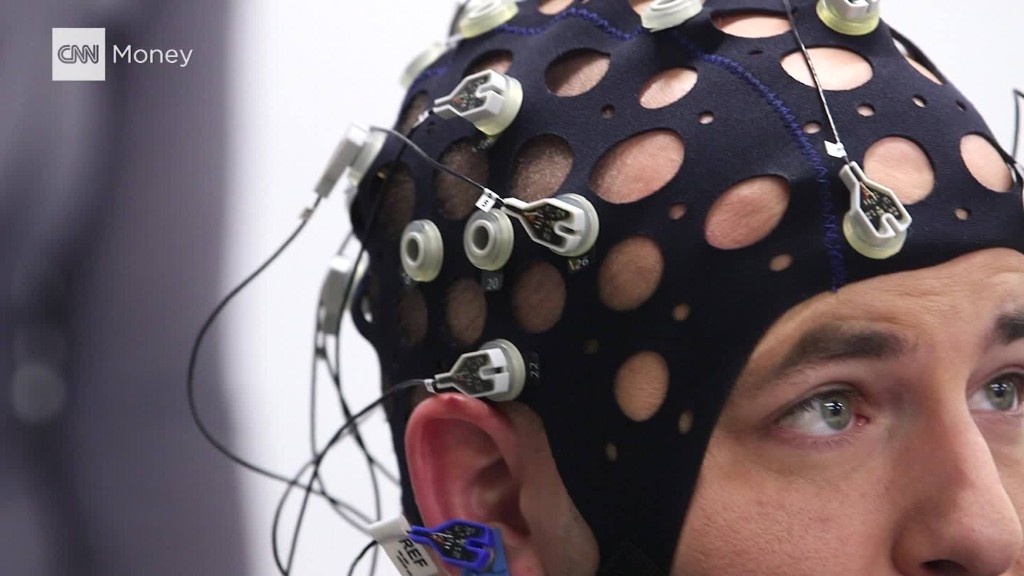
What Trump supporters say about him doesn't always match how they feel when listening to him speak.
A Bethesda, Maryland, startup called Spark Experience examined the effects of political candidates on the human brain and nervous system.
To do so, the firm conducted a study with 30 participants -- 15 Trump supporters and 15 Clinton supporters.
Each participant watched about 40 minutes worth of clips, in a random order, of political ads and the presidential debates.
Spark monitored their reactions using BrainWave, its tech device that tracks and measures brain activity, skin and sweat response, micro movements in facial activity, heart rate, and eye movement.
These are all combined into Spark's proprietary algorithm that determines a viewer's attention span and emotional reaction.
According to Spencer Gerrol, founder and CEO of Spark Experience, some participants downplayed their stance on Trump when asked about him.
Related: Who's donating to Trump? This bot will tell you.
They might say, "I do think he's kind of out there, I don't support all the things he says," Gerrol told CNNMoney.
But when you look at their emotional responses, "we see something different," he said.
When Trump says something to evoke fear of Muslims, for example, it actually does resonate with some Trump supporters.
"You see well-marked fear," Gerrol said, noting that the same speech doesn't elicit that anxiety in Clinton supporters.
The study gives insight into how the same clips resonate with Republicans compared to Democrats.
Emotional stories connect with viewers regardless of their political views. For example, a Democrat viewing Trump's ad featuring his daughter Ivanka experiences peaks of positive emotion as Ivanka speaks lovingly about her father. But when the viewer is reminded that her father is Donald Trump, the emotional response plummets.
Related: Can TrumpSingles make dating great again?
In March, CNNMoney's Brian Stelter reported on the brain activity of about a dozen viewers watching the GOP debate. The small study, conducted by SBB Research Group, found that Trump was the most engaging of the GOP candidates.
At that time, it was unclear how he stacked up to his Democratic counterparts, Hillary Clinton and Bernie Sanders.
But Spark findings reveal that Trump remains the clear winner in captivating viewers -- even when participants aren't fans of him or his policies. On a scale of 0 to 10, Trump averaged a 7.5 attention level. Clinton ranked between 4 and 4.5 and and Bernie Sanders fell somewhere between Clinton and Trump.
It has to do with the candidate's rhetorical style, said Gerrol.
Trump and Sanders have a repetitive rhythm and stress key words. Sanders has strong intonation and frequently pauses for emphasis. Clinton's sentences tend to run together more, she uses bigger words, longer sentences, and includes more policy details.
"People get bored more easily," said Gerrol, who added that Spark has been conducting experiments with BrainWave for the past two years. It has worked with companies like Rovio, the maker of Angry Birds, to test which advertising formats consumers respond best to. It helped retailer Fossil optimize its website for online shoppers by understanding eye movements.
Gerrol said that Spark decided to apply the BrainWave technology to politics in an attempt to understand how voters really view the presidential candidates.
As some may predict, Trump "gets a pass" that the other candidates don't when it comes to his speech.
"For some reason people don't mind hearing baseless attacks from Trump; perhaps it has just become expected," said Gerrol, noting that the same isn't true of other candidates. He added that while some Democrats might say they're fearful of Trump's tendencies, their emotional response indicates that they're actually entertained.
"This is likely because of the enjoyment of the circus-like atmosphere."

